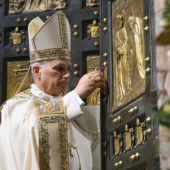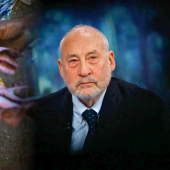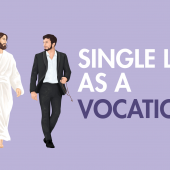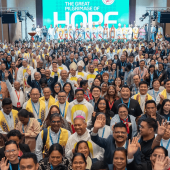Pope Francis – Patron Saint of Commerce & Economics?
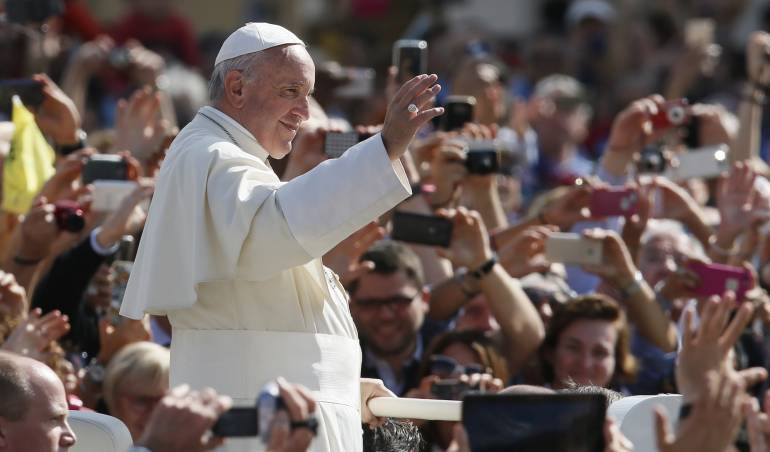
Francis had incredible business acumen and a keen sense of the "signs of the times.”
“Santo Subito!” cries echoed through many streets of the Vatican and Rome as Pope Francis’ body made its way to its final resting place—at least for his mortal remains—at the Basilica of St. Mary Major. But we all know where he truly went: to the house of the Father, so beautifully articulated in the announcement by Cardinal Kevin Farrell, Camerlengo:
“Dearest brothers and sisters, with deep sorrow I must announce the death of our Holy Father Francis. At 7:35 this morning, the Bishop of Rome, Francis, returned to the house of the Father.”
The brief announcement also included these poignant words:
“He taught us to live the values of the Gospel with fidelity, courage, and universal love, especially in favor of the poorest and most marginalized.”
“A poor Church for the poor”
This line of Pope Francis struck me deeply and has stuck with me. Much has been said—and written—about his choices of simplicity, poverty, and humility. But as a banker for over three decades, and a CEO for over half that time, I believe that Francis also had incredible business acumen and a keen sense of the "signs of the times." That is why I’ve chosen this unusual—and perhaps prophetic—title: Pope Francis – Patron Saint of Economics and Commerce.
For too long, it was believed that the business of business is business. But the Pontiff of Hope offered an opportunity for the world of business, commerce, and economics to look for a deeper purpose than just profits. Everything he did and said came from his incredible ability to interact, listen, and engage with people, coupled with his discernment guided by the Holy Spirit.
The following 7 reasons, based on the seven letters of the name FRANCIS, are why the world of business may choose to ignore him—but only at its own peril.
F – For all (Fratelli Tutti)
After decades of espousing the profit motive and shareholder interest, something changed in the business world. On August 19, 2019, 181 members of The Business Roundtable, a group of CEOs from major US corporations, issued a landmark statement:
“While each of our individual companies serves its own corporate purpose, we share a fundamental commitment to all of our stakeholders.”
This was a moment when the world of business came to terms with what Pope Francis had been saying all along, which he later wonderfully summarized in Fratelli Tutti:
“Economic and political structures should prioritize solidarity, and businesses should be held accountable for their impact on communities, the environment, and vulnerable groups.”
R – Reimaginer / Reformer (The Economy of Francesco)
A reimaginer is to the world of business what a reformer is to the world of religion.
Years ago, I caused an uproar in my parish council meeting by suggesting that the feet-washing ceremony of the Maundy Thursday service include women. The idea was shot down at once. Imagine my delight—and possibly a smug grin—when that same year, Pope Francis went ahead and washed the feet of women, prisoners, and others on the periphery on Maundy Thursday.
The Economy of Francesco challenges the business world to rethink and rebuild the economic system by creating an economy that serves all people, ensuring no one is excluded, promoting ecological sustainability and care for creation, rejecting the arms economy, and fostering local economies.
A – Asset-focused (Amoris Laetitia, Christus Vivit)
“People are our greatest asset” is a common business mantra. But this, as we all know, has largely remained lip service.
A look at the toxic work culture around us reveals why Pope Francis was almost John-the-Baptistic (or should I say ballistic?) when it came to the need for solidarity and proper care of the workforce. He urged unions to be “a voice for the voiceless.”
In Amoris Laetitia, he emphasized the work-life balance and the need for economic policies that prioritize social protection for families.
N – No one left behind (Misericordiae Vultus)
In an increasingly insular world, with doors being shut and walls being built—physically, economically (with tariffs), or socially (with cancel culture)—Francis strode boldly as Pontifex (bridge-builder).
Pope Francis sought to build an inclusive Church, as evident in his efforts such as the Synod on Synodality, the construction of shelters and showers for the homeless at the Vatican, etc.
The UN theme of “No One Left Behind” found its best evangelist in Pope Francis. As the CEO of Grameen Capital in India, I saw his vision come to life in our efforts to create economic opportunities for disadvantaged women and excluded segments of society. Francis’ exhortations in Misericordiae Vultus moved me to do more.
C – Climate (Laudato Si’)
Pope Francis was one of the leading voices on the climate crisis. Laudato Si’ was a gift given to the world, both figuratively and literally—he gifted copies to heads of state when he met them.
In it, Pope Francis linked environmental degradation with economic inequality, arguing that the poor are disproportionately affected by ecological crises. He critiqued consumerism and the culture of excessive consumption, advocating for a shift toward simpler lifestyles and sustainability.
I – Impact (Evangelii Gaudium, Gaudete et Exsultate)
The world today is focused on results and outcomes. One of the major trends in business is Impact Investing, or outcome-based, pay-for-performance financing.
As the co-founder of Grameen Impact and the Co-Chair of the Indian Impact Investing Council, I have seen billions of dollars come into Impact Investing in India alone—and trillions globally. It truly makes an impact.
In this age of greenwashing and window-dressing, Pope Francis challenges everyone to create real and positive change. He warns against the idolization of money, emphasizing that true wealth lies in human relationships and solidarity.
He advocates a “preferential option for the poor,” calling on governments and businesses to adopt policies that prioritize the needs of the vulnerable. Under Cardinal Turkson’s leadership, the Vatican hosted the third Impact Investing Conference in July 2018.
S – Sustainable Development Goals (Spes Non Confundit, Jubilee of Hope)
In September 2015, Pope Francis entered the UN General Assembly Hall as the world was launching the 2030 Agenda for Sustainable Development, adopted by 193 countries.
How providential that Pope Francis opened up the door of hope for business and economy a decade before he opened up the Jubilee of Hope for the Church and the world.
I walked those very hallowed UNGA corridors a few years later to speak about Financing and Technology for the SDGs,when the world was beginning to grasp the enormity of the funding gap—exceeding over $30 trillion at that time. Then the pandemic struck, and the gap grew wider.
Once again, Pope Francis strode like a colossus—this time all alone in St. Peter’s Square. And yet, not all alone—he had the Eucharistic Lord with him, reminding us we are never alone.
Now, in this global race to raise the trillions needed for development, as a member of the Global Steering Group for Impact, I find inspiration in Francis. He stands as a beacon of hope, encouraging us never to lose hope—and promises thathope never disappoints. (Spes non confundit) is not abstract optimism for Pope Francis. It is an active, courageous, and practical virtue that drives real change in how we structure economies, lead businesses, and care for one another—especially the poor.
What better way to express our gratitude to this incredible man of God than by imbibing those very virtues and traits that he embodied?
“Don’t forget the poor,” a cardinal said to Bergoglio when it was becoming clear he was about to be elected Pope.
“Don’t forget the poor,” Pope Francis says to us now.
May our actions speak louder than merely saying, “Santo Subito.”
(Royston Braganza, an accomplished businessman and ardent Catholic, lives in Mumbai, western India. A seasoned retreat preacher, he has also played key roles in catechesis, youth ministry, and digital evangelization in the Archdiocese.)
Radio Veritas Asia (RVA), a media platform of the Catholic Church, aims to share Christ. RVA started in 1969 as a continental Catholic radio station to serve Asian countries in their respective local language, thus earning the tag “the Voice of Asian Christianity.” Responding to the emerging context, RVA embraced media platforms to connect with the global Asian audience via its 21 language websites and various social media platforms.










